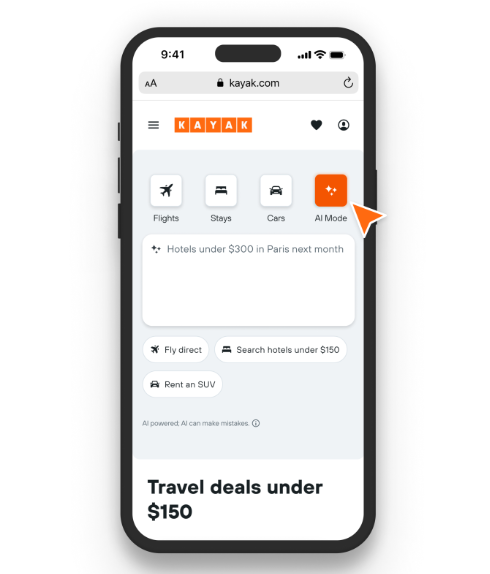Kayak, a travel search engine, has launched the "AI Mode" feature this week, allowing users to ask travel-related questions through an AI chatbot integrated on the website and compare and book flights, hotels, and car rentals. This feature is now available on desktop and mobile web versions, and it provides contextual search results based on the integration of Kayak's technology with ChatGPT.
This feature is an extension of the Kayak.ai testing platform introduced in April. At that time, Kayak created a separate website to experiment with AI technology, combining its data and tools with OpenAI's technology, allowing the technical team to test various AI features before deploying them to the main site. The current AI mode essentially integrates the functions of Kayak.ai directly into the main Kayak site.

From a usage perspective, users can ask the chatbot for travel advice, such as destinations they can fly to within a specific budget, the best deals for a certain destination, hotel facility comparisons, direct flight options, and car rental choices. The system also supports open-ended questions, such as "Where should I go for New Year's celebrations", where the AI will provide recommendations based on the needs. Users can also inquire about the best times to travel based on ticket prices. Kayak shared more examples of AI prompt usage on its blog.
This feature mainly targets the early stages of travel planning, when users are still exploring ideas rather than preparing to book immediately. However, whether users who obtain information in this way will ultimately convert into paying customers remains to be verified by the market.
The AI mode was first launched in the United States in English, with plans to expand to other countries and languages later this month. The company also said it will soon roll out the feature to more platforms and add voice request support.
The tourism industry has become a key application area for AI technology, as the current online booking experience is often cumbersome and frustrating for consumers. To test the demand for AI solutions in the market, OpenAI recently entered into cooperation agreements with travel companies such as Expedia and Booking.com (the latter is part of the Booking Holdings group), enabling these services to run as apps within ChatGPT.
In contrast, Kayak chose to run the AI chatbot on its own website, a strategy that may allow the company to directly collect user behavior data and insights on the use of AI features. From a competitive perspective, embedding AI assistants in third-party platforms versus keeping them within their own channels represents two different product approaches — the former relies on traffic entrances, while the latter maintains control over user data and experience.
For the travel search industry, whether AI chatbots can truly improve the user experience and increase conversion rates depends on the accuracy of their recommendations, the comprehensiveness of the search results, and the efficiency advantages compared to traditional search methods. This requires verification of the practical value of AI in complex decision-making scenarios such as travel planning through actual usage data.









